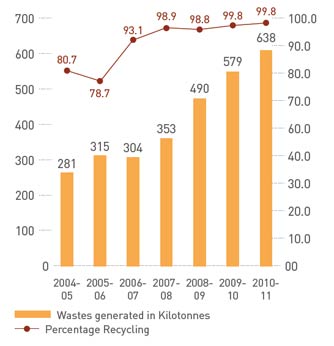 Towards 100% Recycling Towards 100% Recycling
Wherever generation of waste cannot be eliminated due to limitations on processes or technology, ITC Businesses/Units are mandated to recycle all (100%) wastes which not only saves precious natural resources and energy but also prevents wastes from reaching landfills, with all its attendant problems such as health hazards, increase in GHG emissions, soil and ground water contamination, etc.
Recycling also creates significant employment opportunities.
Waste Destination
The graph below depicts the final destinations of total wastes:
 |
|
Progress on waste recycling |
| |
 |
We have ensured recycling of 99.8% of waste generated, the same level as last year, although the total quantity of waste has gone up by 10.3%.
India's largest integrated paper & paperboards mill, Bhadrachalam which generated 76.5% of the total wastes generated in ITC, recycled more than 99% wastes in 2009-10 – a noteworthy achievement. Bhadrachalam generated 1116 kg of waste per tonne of paper/paperboard in 2010-11; an increase of 8.3% over last year (1030 kg/tonne in 2010-11), due to enhanced pulp production to substitute imported pulp and increased manufacture of value added products over the previous year. However, this is better than the performance of all other integrated mills in India. According to the Centre for Science and Environment Report, 'All About Paper' (2004), similar mills generated 1200 Kg. of solid waste per tonne of paper.
In 2010-11, ITC generated 288,204 tonnes of fly ash, (45.1% of total waste in ITC), which is 17.2% more than the previous year due to low-grade coal and significant growth in production volumes in the Paperboards and Specialty Papers Business. Despite this increase, we have ensured 100% fly ash utilisation for brick making, road/embankment construction and as raw material in cement factories.
|

